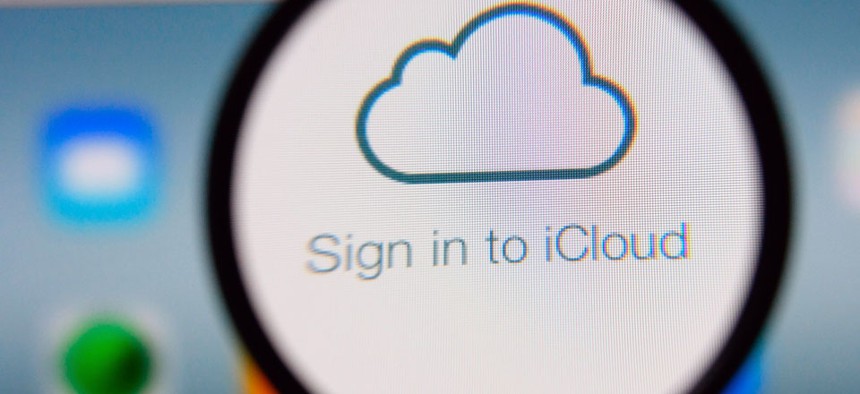What Does Alleged iCloud Hack Mean For Federal Agencies?

Gil C/Shutterstock.com
Federal employees could be uploading sensitive information when they work on their personally owned iPhones.
Most federal agency employees with iPhones probably don't have to worry about hackers ogling naked photos of them saved in Apple’s iCloud backup system.
But they might have cause for concern about attackers targeting the cloud service to peer at sensitive government information, cybersecurity experts warn.
The problem, experts say, is a lack of awareness. iCloud, by default, automatically backs up a user’s device over Wi-Fi every day, according to Apple's website.
Federal employees could be uploading sensitive information when they work on their personally owned iPhones -- unless agencies take action. And it is not clear that they are.
"Most people have no concept that the data goes out to different places," said Kevin Johnson, CEO of Secure Ideas, a company that tests federal systems for security holes.
The concerns, however, appear to be largely limited to employees’ personal devices. The federal agencies contacted by Nextgov said they blocked access to iCloud on government-owned devices -- and even some personal devices -- as a matter of agency policy.
Concerns Not Limited to Apple
Over the weekend, cybercrooks allegedly snatched explicit photos from the iCloud accounts of dozens of female celebrities, including Oscar winner Jennifer Lawrence, and dumped some of them online. Whether this was done through a bug in Apple's infrastructure, surveillance software, cracking each celeb’s password or a combination of the above is unclear.
But if federal employees don’t know to disable the service, iCloud could potentially save the GPS coordinates of undisclosed federal facilities, wireless device configurations, work documents an employee wants to work on at home and office photos, among other things.
Those worries aren’t limited to Apple.
"Some Android phones automatically sync to [cloud storage site] Dropbox, which is even more of a concern because Dropbox is designed to be used for any file type, whereas iCloud is for specific types," Johnson said.
Jerry Irvine, a member of the National Cyber Security Partnership, a public-private organization, said personal devices synced to iCloud or any other uncontrolled third-party cloud certainly present a threat to the government.
The "phone itself is connected to the agency's network and the iCloud," he said. "If a federal employee or a consultant is allowed to bring their personal iPhone into the work environment, that is a potential risk."
Irvine, who consults for state and local agencies, added: “They could send emails. They could see emails. All of that could be saved to the cloud without knowledge of the federal government.”
It's unclear what role, if any, the Department of Homeland Security, which supervises federalwide cybersecurity, plays in regulating agencies bring-your-own device, or BYOD, policies. DHS declined to comment.
The most recent BYOD guidance from the White House is two years old and does not address cloud access.
Agency-Owned Devices More Likely to be Protected
Unlike individually purchased smartphones, government-owned iPhones are more likely to be protected, security professionals and agencies say.
Immigration and Customs Enforcement, for example, deactivates iCloud on each iPhone the agency issues to employees, ICE officials told Nextgov.
"Restrictions are enforced using device policy settings installed on every iPhone ICE provides employees," agency spokesman Brandon Montgomery said in an email. iCloud is not sanctioned for storing agency data, ICE officials said.
At the General Services Administration, software that centrally manages personnel's smartphone use, called MaaS360, disables iCloud on both BYOD phones and GSA-owned phones, agency officials told Nextgov.
"GSA does not allow document-sync to iCloud," agency spokeswoman Jackeline Stewart said in an email.
NASA spokesman Allard Beutel told Nextgov "iCloud is not approved" for storing and processing NASA data, regardless of whether it’s used on a NASA-owned or a BYOD device. Space agency officials were unable to immediately comment on how they enforce the ban.
As news of the hack surfaced, security researchers described a method for exploiting an iCloud weakness -- nicknamed iBrute, for "brute force" -- that allowed infiltrators to test tons of password attempts without locking the account. Apple released a patch for the vulnerability shortly afterward.
On Monday, Apple denied the security of the iCloud system was responsible for the breach. An investigation into the incident is still ongoing.
"We have discovered that certain celebrity accounts were compromised by a very targeted attack on user names, passwords and security questions," the company said in a statement. "None of the cases we have investigated has resulted from any breach in any of Apple’s systems including iCloud.”
(Image via Gil C/Shutterstock.com)






